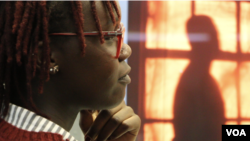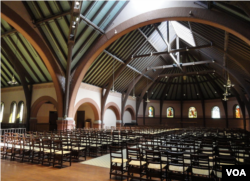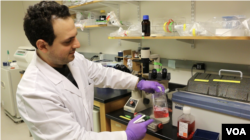Faith Rotich was tired of waiting.
After she completed high school in Kenya in 2012, the University of Nairobi accepted her into an undergraduate degree program. But it’s typical for Kenyans to wait for space to open up at public universities, even up to a year, so Rotich began thinking about other possibilities.
Like school in the United States.
Rotich received assistance from the Kenya Scholar-Athlete Project, or KenSAP, a program that helps high school graduates with little money, to apply to highly selective colleges and universities in the United States and Canada.
When her first choice, Yale University in Connecticut, did not admit her, she looked to Dartmouth College in nearby New Hampshire, and started her undergraduate work in mathematics.
When she arrived in fall 2014, Rotich says she could not believe her eyes. From Eldoret, a town of about 290,000 people in western Kenya, Rotich said she was shocked at how the school and town looked like the pictures she had seen on the internet.
“I felt a certain kind of happiness, that I want to explore this place, I want to know what it’s like,” she says. “I met some wonderful students who immediately made me feel like I really belong here.”
Dartmouth is a private research university in Hanover, a pretty college town on the New Hampshire-Vermont border and the Connecticut River. Of the 11,200 people in town, more than half are students.
Dartmouth is also an Ivy League school, meaning it is one of eight coveted, private colleges and universities in the New England area. Ivy League schools are considered to be among the best in the world. Dartmouth has earned the highest ratings and accolades by educators and students.
Rotich attends Dartmouth through the King Scholar Leadership Program, which selects students from developing nations and supports their education to help fight poverty.
Exploration has been a big part of Rotich’s experience at Dartmouth, which is atypical for most higher education around the world where teachers lecture and students record.
Rotich took a religion class that asked her to question religious beliefs. She says where she is from, conservative Christianity is strong, with strict rules about behavior. Her mother worried that she might lose respect for her culture, she says. But after Rotich explained that the class improved her critical thinking, Rotich’s mother relaxed. Her mother saw the value in the respectful way professors teach these classes.
Rotich became a photographer for the student newspaper and has shown her work at exhibitions. And she's considering changing her studies from mathematics to economics and anthropology.
Like Rotich, Gilbert Rahme from Lebanon had little money growing up.
After completing his primary and secondary education at a Catholic school in Beirut, he had two choices: continue his job as a bartender, or attend the only free public university in Lebanon.
He chose an education at Lebanese University, earning undergraduate degrees in biology and geology in 2008. A year later, he began a master’s degree program in biology at the American University of Beirut.
His interest in scientific research grew, specifically about cancer and how to fight it. He said he was drawn to Dartmouth for two reasons: the intense focus on academics and research, and his love of cold weather.
(The average winter temperature in Hanover, New Hampshire, is between -2 and -12 degrees Celsius. In other words, really cold.)
Rahme says his Dartmouth interview was difficult and challenging. And that excited him. He began his studies there in 2010.
Dartmouth’s support for his research into cancer biology is like nothing Rahme has seen before, he says.
“We had to deal with a very tough funding situation at the American University in Beirut,” he says. “So the research funding we had for a year was equivalent to what I spend here in a week.”
In the past seven years, Rahme says there have been few problems he could not solve. Rahme says he overheard Americans insulting immigrants after the terrorist attack on the Boston Marathon in 2013, not knowing he was from abroad. Rahme says he used the moment to explain how hurtful those comments could be.
Please leave a comment here, and visit us on Facebook, Twitter, Instagram and LinkedIn, thanks!
After she completed high school in Kenya in 2012, the University of Nairobi accepted her into an undergraduate degree program. But it’s typical for Kenyans to wait for space to open up at public universities, even up to a year, so Rotich began thinking about other possibilities.
Like school in the United States.
Rotich received assistance from the Kenya Scholar-Athlete Project, or KenSAP, a program that helps high school graduates with little money, to apply to highly selective colleges and universities in the United States and Canada.
When her first choice, Yale University in Connecticut, did not admit her, she looked to Dartmouth College in nearby New Hampshire, and started her undergraduate work in mathematics.
When she arrived in fall 2014, Rotich says she could not believe her eyes. From Eldoret, a town of about 290,000 people in western Kenya, Rotich said she was shocked at how the school and town looked like the pictures she had seen on the internet.
“I felt a certain kind of happiness, that I want to explore this place, I want to know what it’s like,” she says. “I met some wonderful students who immediately made me feel like I really belong here.”
Dartmouth is a private research university in Hanover, a pretty college town on the New Hampshire-Vermont border and the Connecticut River. Of the 11,200 people in town, more than half are students.
Dartmouth is also an Ivy League school, meaning it is one of eight coveted, private colleges and universities in the New England area. Ivy League schools are considered to be among the best in the world. Dartmouth has earned the highest ratings and accolades by educators and students.
Rotich attends Dartmouth through the King Scholar Leadership Program, which selects students from developing nations and supports their education to help fight poverty.
Exploration has been a big part of Rotich’s experience at Dartmouth, which is atypical for most higher education around the world where teachers lecture and students record.
Rotich took a religion class that asked her to question religious beliefs. She says where she is from, conservative Christianity is strong, with strict rules about behavior. Her mother worried that she might lose respect for her culture, she says. But after Rotich explained that the class improved her critical thinking, Rotich’s mother relaxed. Her mother saw the value in the respectful way professors teach these classes.
Rotich became a photographer for the student newspaper and has shown her work at exhibitions. And she's considering changing her studies from mathematics to economics and anthropology.
Like Rotich, Gilbert Rahme from Lebanon had little money growing up.
After completing his primary and secondary education at a Catholic school in Beirut, he had two choices: continue his job as a bartender, or attend the only free public university in Lebanon.
He chose an education at Lebanese University, earning undergraduate degrees in biology and geology in 2008. A year later, he began a master’s degree program in biology at the American University of Beirut.
His interest in scientific research grew, specifically about cancer and how to fight it. He said he was drawn to Dartmouth for two reasons: the intense focus on academics and research, and his love of cold weather.
(The average winter temperature in Hanover, New Hampshire, is between -2 and -12 degrees Celsius. In other words, really cold.)
Rahme says his Dartmouth interview was difficult and challenging. And that excited him. He began his studies there in 2010.
Dartmouth’s support for his research into cancer biology is like nothing Rahme has seen before, he says.
“We had to deal with a very tough funding situation at the American University in Beirut,” he says. “So the research funding we had for a year was equivalent to what I spend here in a week.”
In the past seven years, Rahme says there have been few problems he could not solve. Rahme says he overheard Americans insulting immigrants after the terrorist attack on the Boston Marathon in 2013, not knowing he was from abroad. Rahme says he used the moment to explain how hurtful those comments could be.
Please leave a comment here, and visit us on Facebook, Twitter, Instagram and LinkedIn, thanks!







